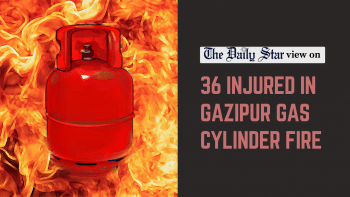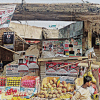Repeated fire cannot be the story of a modern Bangladesh

We are beyond disturbed by the relentless tide of fire incidents in and around Dhaka. From oft-frequented restaurants in upscale neighbourhoods to market buildings and warehouses in Old Dhaka to worker colonies in Gazipur and shanties in various slums, no place is safe enough anymore. The site of the latest incident—Godown slum—is more familiar by association with the Korail slum, a "household name" as far as fire hazards are concerned. The incident occurred on Sunday, and since then we have come across story after story of how it upended the lives of people already struggling with poverty and the many challenges that come with it.
The poor residents of this portion of Banani are no stranger to fires that devastated countless shanties in recent years. The latest incident, too, burnt down hundreds of shanties, affecting the lives of over 500 people from nearly 200 families. For these people, each devastated shanty represented not just the loss of their home and precious belongings but also the shattering of their dreams. One of them is Fatema Akter, a second-year student of Eden Mohila College. Fatema used to tutor children and sew clothes to pay for her studies and family. Now, she must start from scratch. Another victim is Babu Mia, a driver who was yet to recover from a horrific road accident when the fire occurred. Now, debt-ridden and having lost everything, he must conjure up a way to support his family.
Stories like these have become too common in recent years thanks to a spike in fire incidents. Authorities, after the Godown fire, have promised assistance and compensation for the victims. Private donors have come forward to help with their daily meals. But we know from experience that soon both funds and sympathies will dry up, and those affected will be left on their own to figure out how to rebuild their lives, a challenge that many will likely fail. We need to reverse this catastrophic cycle of destruction. We need to put an end to the fire woes of our cities. This cannot be the story of a modern Bangladesh.


 For all latest news, follow The Daily Star's Google News channel.
For all latest news, follow The Daily Star's Google News channel. 









Comments